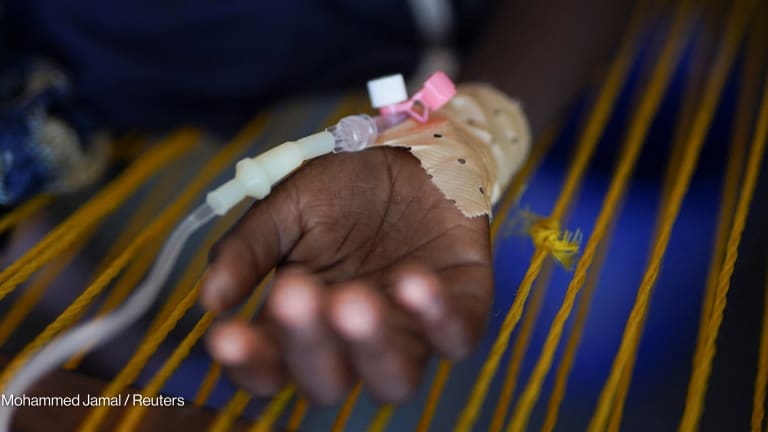What's the problem with WASH innovation?
There are a few, according to experts. But a hyperfocus on shiny new gadgets tops the list.
BANGKOK — For years, Susan Davis heard the same reports of failed or broken water systems presented at water and sanitation conferences all over the world. Innovations presented at most gatherings, meanwhile, usually focused on gadgets or “things” — often versions of the latrines, filters or dispensers that were failing elsewhere. Davis, a WASH expert who has previously worked for Water.org, Water for People, and CARE, founded research and consulting firm Improve International in 2011 to help end the unacceptably high failure rates of water and sanitation interventions in developing countries. Still, unproven new products continue to enter the sector and grab headlines, often buoyed by one-off innovation prize money. “You can't fault people for saying ‘this is a huge problem,’ and for wanting to solve it,” said Davis of the fact that 844 million people lack access to basic drinking water service and 4.5 billion lack safely managed sanitation, according to a 2017 report by the World Health Organization and UNICEF. The issue, Davis and other WASH experts tell Devex, is not willingness to solve these problems, but the hyperfocus on gadgets to achieve sustainable results at scale. It’s data, service delivery, and overall process improvement that should more equally or more often claim the spotlight — and the funding. Considering the wording of Sustainable Development Goal 6, which aims to “ensure availability and sustainable management of water and sanitation for all,” there is understanding as a sector that “services and system approaches [are] the desired method forward,” explained Adam Drolet, WASH program officer for international health organization PATH. PATH’s human-centered WASH innovation design has varied from improving latrine slabs to developing landlord financing schemes for sanitation products in urban settings, but the way they approach their new ideas is the same, Drolet said. Their innovations need to be repeatedly stress tested to account for user needs, contextual needs, and market needs at different levels, and most importantly they need to hit on three things: Affordable, aspirational, and appropriate. It’s “stuff that sounds simple and basic until you realize no one else was doing it” that is really going to change the WASH game. --— Susan Davis, founder of Improve International The sector will be slow to shift in the direction of funding service delivery and better data management if organizations and donors stray from those benchmarks to look for the next game-changing gadget, according to Annie and John Feighery, co-founders of nonprofit tech startup mWater. “A lot of the innovation in WASH is still tapping into a desire to make a hard problem simpler,” said John Feighery. “There’s a market for something that looks innovative,” he said. ”But we've known how to get cheap water at scale since the 1800s. There’s not a lot of innovation that needs to go into the fundamental technology.” There’s always a possibility for revolutionary tech, he added, but Feighery would rather see ideas to tackle the never-ending problem of how to attract enough finance to build out WASH infrastructure around the world. For the past few years, the WASH innovation scene has been captivated by a solar-powered device that can harvest water from the air, for example. Although it was recognized as one of the World Economic Forum's top 10 emerging technologies of 2017, its hefty price tag makes it an expensive solution for water-scarce regions, which is frustrating to other innovators in the sector with an eye on scale. A wider reaching, proven focus across the board when it comes to water would be on pipes, Annie Feighery said, adding that what turned New York City from the world’s biggest slum to a financial capital wasn’t a sexy innovation: “It was pipes, infrastructure, and management systems within the government.” Data measurement and WASH management is what Annie and John Feighery sought to improve when they founded mWater six years ago as a system to safely and sustainably manage water systems. Like Davis, they seek to change the sector from the inside out by making data about what works more widely accessible. In their case, by creating a free platform that allows organizations or governments to have a clear view of the status of water infrastructure in real time, for example, and to make it transparent to donors and funders. “The more you can show that a utility is doing a great job with funding, the funders will start to change, the NGOs will start to change, all of the systems have to start working toward supporting that,” Annie Feighery said. Though they don’t find themselves on the short list for large innovation prizes, their lean team of eight has developed a system that four national governments and 742 city and district governments are now using around the world. There are plenty of other examples of innovation that aren’t “sexy,” but are changing the game, Davis said. Just a few years ago, “nobody knew how much it cost to keep a water point functioning,” she said, until international think tank IRC WASH conducted a life cycle cost analysis in several districts in Ghana. “If you think about how long people have been working in this field, it’s shocking that we just didn’t know,” she said, adding that it’s just one example of an under-recognized piece of the puzzle. Other efforts Davis has her eye on are similarly simple, like Nepali group Nepal Water for Health, which helps communities install water points, then regularly calls the caretaker in charge to find out if their water is flowing. If it’s not, they can try coaching over the phone or schedule a visit, but the idea is that the assistance is targeted, consistent, and affordable. It’s “stuff that sounds simple and basic until you realize no one else was doing it” that is really going to change the WASH game, Davis said. But in the “cottage industry” for innovation that aid has created, there is more often funding for starting out a new idea or product and little for proving them at scale, according to Annie and John Feighery. “Everyone has this mindset of searching for a unicorn,” Annie Feighery said of Silicon Valley’s term for a $1 billion startup. “In aid, you can't have unicorns, we’re looking at something that is by definition a smaller market. So we’re trying to apply a metric of success that’s not going to happen in aid.” There’s not enough money in water and sanitation in general, John Feighery added, considering even the rural water supply in the United States is subsidized: “We're not going to get to where it makes more money than it costs,” he said. “We have to get away from expecting something to scale on its own to figuring out how to make investment go further.” PATH’s Drolet would also like to see a reversal in the trend of multiyear grants moving to smaller grants with shorter timelines. It’s a funding shift that’s “behind the curve in terms of organizations that are looking at service approaches in general.” There does need to be an even mix of both systems and products, he said, but short-term funding often fails to support critical pieces like personnel or addressing social stigma and norms. Time constrained grants also “inhibit organizations’ ability to really think about systems because system change takes so much time and effort,” Drolet said. “You can get outputs in a couple of years, but you can't get outcomes.” A commitment to performance-based and flexible grants in the sector could serve to catalyze that shift even more toward a systems-thinking approach, he said. In the meantime, Improve International’s Davis plans to continue to unearth WASH products and systems innovations that are working — “If you're not asking the right questions, you're probably never going to hear about it,” she said — and encouraging the sector to learn from its well-intentioned mistakes.
BANGKOK — For years, Susan Davis heard the same reports of failed or broken water systems presented at water and sanitation conferences all over the world. Innovations presented at most gatherings, meanwhile, usually focused on gadgets or “things” — often versions of the latrines, filters or dispensers that were failing elsewhere.
Davis, a WASH expert who has previously worked for Water.org, Water for People, and CARE, founded research and consulting firm Improve International in 2011 to help end the unacceptably high failure rates of water and sanitation interventions in developing countries.
Still, unproven new products continue to enter the sector and grab headlines, often buoyed by one-off innovation prize money.
This story is forDevex Promembers
Unlock this story now with a 15-day free trial of Devex Pro.
With a Devex Pro subscription you'll get access to deeper analysis and exclusive insights from our reporters and analysts.
Start my free trialRequest a group subscription Printing articles to share with others is a breach of our terms and conditions and copyright policy. Please use the sharing options on the left side of the article. Devex Pro members may share up to 10 articles per month using the Pro share tool ( ).
Kelli Rogers has worked as an Associate Editor and Southeast Asia Correspondent for Devex, with a particular focus on gender. Prior to that, she reported on social and environmental issues from Nairobi, Kenya. Kelli holds a bachelor’s degree in journalism from the University of Missouri, and has reported from more than 20 countries.








